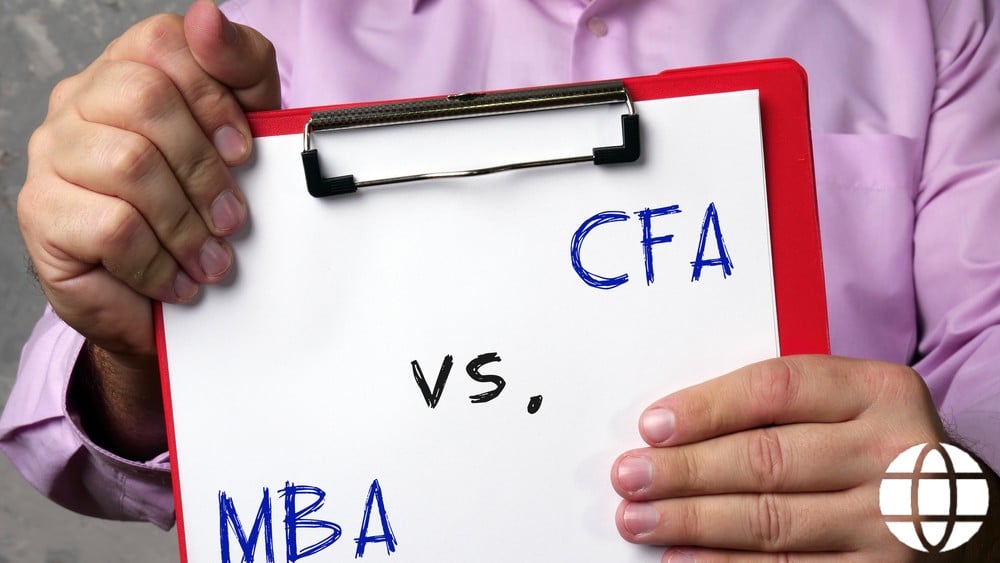Hey there, welcome to this detailed guide on becoming a Chartered Financial Analyst.
As an aspiring CFA, this article will help you prepare mentally and know what to expect for the whole rigorous process of attaining the CFA designation.
By the end of this article on how to become a CFA, you will have understood every step to obtain this credential.
We will cover the following in this article:
And here it begins!
Steps To Becoming A CFA
The CFA credential has helped many financial professionals demonstrate their ability to meet their client’s unique financial needs while at the same time showing their commitment to higher ethical standards.
Many finance professionals have realized the importance of CFA certification and have dedicated their time to obtain one.
There are CFA career opportunities across all the financial industry sectors such as asset management, investment management, wealth management, insurance, commercial, or investment banking.
CFAs can also work as research analysts, investment strategists, or consultants. They can also effectively work in portfolio management.
The CFA charter-holder portfolio managers report the base salary for CFAs in 2019 was $126 000 and the total compensation accumulated to $177000 as per the CFA Institute data.
With such obvious benefits and many career opportunities, this makes pursuing CFA certification worth it. So how do you become a CFA?
Your path to becoming a CFA might be different from someone else’s, but there are those common steps that you must take to become a Chartered Financial Analyst.
The steps are as follows:
- Step 1: CFA Program Enrollment
- Step 2: Passing The CFA Exams
- Step 3: Obtaining Qualified Work Experience
- Step 4 Submission Of Reference Letters
- Step 5: Charterholder Application
Step 1: Program Enrollment
The initial step you must take to officially become a CFA candidate is enrolling in the CFA program before registering for the Level 1 exam.
Successful enrollment into the program requires you to meet the following CFA examination requirements:
- You must hold a bachelor’s degree
- You should be in your final year of your bachelor’s degree program if you don’t have it already
- You must have completed four years of full-time work experience and higher education
On top of the above CFA eligibility requirements, you must also have your international travel passport and have the ability to take the exams in English.
Ensure you meet the professional conduct admission criteria and reside in a participating country.
Step 2: Passing The CFA Exams
To become CFA, you must pass all three levels of the CFA exams in succession.
The exam topics are ethical and professional standards, equity investments, economics, portfolio management, and fixed income.
Every exam focuses on a certain aspect of investment.
Level 1 Exam: This CFA Level I exam is all about investment tools and your knowledge of ethical and professional standards.
It is also a multiple-choice questions exam.
Level 2 Exam: This exam entails asset valuation and testing your ability to apply standards to situations that analysts come across.
Level 3 Exam: The exam that focuses on portfolio management, testing your ability in the application of standards regarding portfolio management and compliance.
The Key Lies In Adequate Preparation
You cannot obtain the CFA charter if you fail the exams.
These three exams require adequate time investment because they are difficult to pass.
Some professionals study for the exam while still working as finance professionals, while others prefer to focus on studying only to increase their chances of success.
According to the CFA Institute, the average candidate takes 322 hours to prepare for each exam level.
To help students pass the exams, the CFA Institute has made available study materials such as the CFA Institute textbook as part of the study package.
Study Tips To Help You Pass
The majority of the candidates usually take about 5 years to sit for and pass all exam levels.
Some useful tips to consider when studying for those exams are as follows:
- Make sure you begin early to give yourself ample study time
- Plan for at least 300 study hours for each exam level and make a target of 15 hours every week
- Make procrastination plans to avoid losing time and secure enough time for study
- Make sure you use only a legitimate CFA exam prep course such as Schweser that will expose you to an effective and personalized self-study course that industry-expert instructors teach
Theoretically, you don’t need those third-party guides to take your exam, but when it comes to practice, a great percentage of candidates acquire study supplements to speed up their studying or boost their weaker areas.
Keep exam deadlines in mind.
Remember that the CFA exam is available twice yearly for Level I and yearly for Levels 2 and 3.
Make solid plans ahead to ensure that you don’t miss deadlines or run out of study time.
Step 3: Obtaining Qualified Work Experience
The work experience requirements are very important for becoming a CFA charter holder.
Ensure that you meet the requirement of 48 months of “acceptable work experience”, which you can achieve before, during, or after taking your CFA exams.
The CFA Institute has a few rules about work experience that is acceptable.
You must have a wide range of financial and investment experience that covers areas such as trading, corporate finance, and economics.
Most of the work must involve that very important investment strategy process.
After passing level III, you must accumulate 4 years of this relevant experience before obtaining the charter.
Relevant experiences are defined widely, and some examples are:
- Evaluation of the application of economic, financial, and statistical data during the crucial investment decision-making process involves securities or other similar investments
- Direct or indirect supervision of people who undertake those activities
- Teaching those activities to students
Ensure you obtain the relevant work experience because the Institute will expect proof.
Step 4: Submission of Reference Letters A CFA
After passing all three exams and acquiring work experience, you must prepare reference letters that you will submit to the CFA Institute.
These letters will prove your abilities and professional conduct and also further explain why you deserve the charter.
The references must come from supervisors or current CFA charter-holders.
Submit these reference letters within the deadline as stipulated by the CFA Institute.
Step 5: Charterholder Application
After meeting all the above requirements, you now successfully apply to become a CFA charter holder.
You must submit the stated payment and the necessary documentation for review.
The institute will then take 10 business days to review your membership application if it is regular.
But, if your membership application is an affiliate one, the Institute will take about 4 weeks to review.
When the review time is up, you will then receive an email notification informing you whether you have officially become a CFA charter holder or not.
The application process for the two types of memberships is different, and here is how:
Regular Membership
You must pass the level I exam to successfully apply for regular membership. Here are the requirements to acquire regular membership:
- Hold a bachelor’s degree or equivalent from an accredited institution
- Take the Level 1 exam and pass
- Earn the required professional work experience, which is usually 48 months
- Submit all the professional reference documents
- Agree to abide by the professional conduct statement by signing the member’s agreement
- Make a payment of the yearly fees
- Ensure that you abide by the compliance policy of OFAC
Make sure you don’t reside in countries whose residents can’t become CFAs or society members.
Affiliate Membership
For you to make this application, you must be an investment professional.
Affiliate membership applications do not require you to enroll in the Chartered Financial Analyst program, which means you could simply pursue the CFA charter holder.
To qualify for application for this membership, you must have met the following requirements.
- You must have local CFA society membership
- You must submit all the professional reference documents
- Sign the member’s agreement as a commitment to adhere to the professional conduct statement
- Make payment for the required annual fees
- Abide by the compliance policy by OFAC and ensure that you are not from one of the countries whose residents have been prevented through law from being a CFA institute or becoming a society member
- Applicants can check the progress of their applications by clicking on the link on the application home page after logging in
- After completing the online application, you will receive an email notification with a link to open an online form
This is the form you forward to all your sponsors, and they should fill in the form as per the requirements.
- After the application is approved by the society, the applicant receives another email to confirm the status. Instructions for membership activations are included in this email
- You must then pay the required dues and file a member’s agreement. This is done during the activation process to activate the membership
Note that the perks of regular and affiliate memberships are similar, except that the affiliate doesn’t qualify for the CFA charter. The affiliate members also have no right to cast votes.
After you officially become a Chartered Financial Analyst, you will have to continue your education to maintain the charter holder status.
However, this should not worry you because various companies offer Continuing Professional Education courses online.
Most of them offer flexible schedules of their courses to help you meet the continuing education needs of the CFAs and other accounting professionals.
The Code Of Ethics And Standards Of Professional Conduct
To become a Chartered Financial Analyst, observing the Code of Ethics and Standards of professional conduct is a must.
They are moral principles that every investment professional must follow globally.
If you become a member of the Institute or the moment you sign up as a CFA candidate, you must observe the set standards.
You must actually notify your employer of these standards, which you should uphold if they are not aware.
This is for further accountability on your part and is one of the major CFA license requirements.
Conclusion
The CFA process is widely known for its difficulty, especially in the exam process.
Unfortunately, this is the main part of becoming a CFA. Unlike the majority of the US professional exams, the CFA program is prolonged and takes a couple of years to complete.
We have seen all the steps on becoming a CFA charter holder, including how you must dedicate 300 hours of study for each level of exam which means 900 hours for the three exams, and this is not inclusive of the possible retakes.
If you are ready to undergo such a challenge and become a CFA, which is the gold standard of the financial advisor career.









